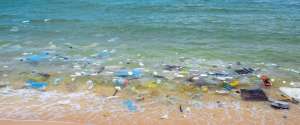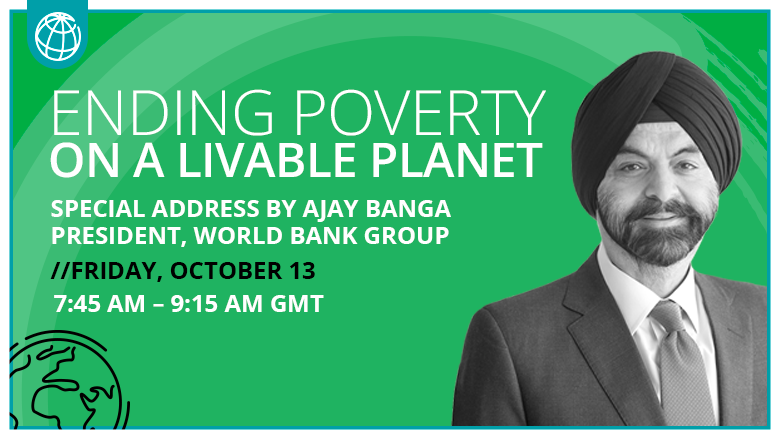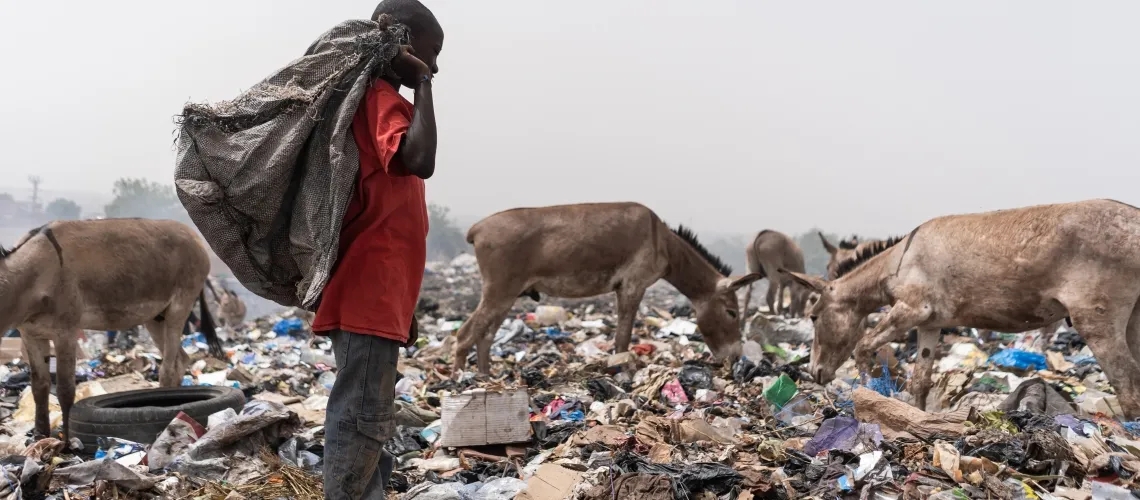Your commute to work, the family gathering, the food on your table, and the goods you buy – all rely on transport and our lives are unthinkable without it. But transport also represents a growing threat to our planet. Buses, cars, planes, ships, and trucks burn fossil fuels, and this causes climate change.
all rely on transport and our lives are unthinkable without it. But transport also represents a growing threat to our planet. Buses, cars, planes, ships, and trucks burn fossil fuels, and this causes climate change.
Tag Archives: Plastic
Ending poverty on a livable planet
Fish, Not Plastics: Science to Rescue Africa’s Sea Pollution
We can’t have a world without poverty in a world with plastic pollution
This is a story that started as an environmental crisis, and quickly became an economic and health crisis. And it’s a story that intersects with the triple planetary crises we are grappling with today: biodiversity, climate, and pollution. We are on the brink of writing the next important chapter in this story.
Turning the Tide on Marine Plastics in South Asia
South Asia is the third largest contributor to global plastic waste. It generates 334 million metric tons of solid waste every year. Nearly 70-80% of this waste ends up in the ocean 12% is plastic. On current trends, if no action is taken, the amount of mismanaged waste (including plastic) across South Asia is projected to double to 661 million tons by 2050, adversely affecting the region’s ocean ecosystems, livelihoods, human health, and sustainable development more broadly. COVID-19 has further exacerbated plastic pollution, with increased demand for single-use plastic and pressure on solid waste management systems.
tons of solid waste every year. Nearly 70-80% of this waste ends up in the ocean 12% is plastic. On current trends, if no action is taken, the amount of mismanaged waste (including plastic) across South Asia is projected to double to 661 million tons by 2050, adversely affecting the region’s ocean ecosystems, livelihoods, human health, and sustainable development more broadly. COVID-19 has further exacerbated plastic pollution, with increased demand for single-use plastic and pressure on solid waste management systems.
Event Link
eC2: Assessment of Options and Opportunities for Riverine Plastic Waste Collection Technologies in Southeast Asia
Deadline: 13-Apr-2021 at 11:59:59 PM (Eastern Time – Washington D.C.)
Key tasks:
– assessment of plastic waste collection technologies currently available on the market with the purpose of collecting plastic waste from water bodies, particularly rivers, urban canals, and coastal shorelines
– the assessment shall include, but may not be limited to: technical outline of system; location suitability assessment; investment and operational costs; O&M requirements; financing mechanisms; recyclability of material; others
– desk based global assessment incorporating accessible local knowledge to develop country-specific sections and including selected case studies with focus on Mekong countries, Philippines and Indonesia.
eC2: Preparation studies for Environmental and Social Framework Documents for proposed World Bank financed Solid Waste and Plastic Management Improvement in Cambodia.
Deadline: 27-Oct-2020 at 11:59:59 PM (Eastern Time – Washington D.C.) 
For preparation support for the proposed World Bank financed Solid Waste and Plastics Improvement Project, consultants will conduct:
(i) an Environmental and Social Management Framework -ESMF-;
(ii) an Environmental and Social Impact Assessment -ESIA- for proposed Solid Waste Investments, including landfill in Siem Reap and
(ii) ESIA for Solid Waste Investments for second secondary municipality in Cambodia and (iii) Stakeholder Engagement Plan for the entire Project.
The projects Environmental and Social Management Framework (ESMF), will include:
a. Labor Management Procedures (LMP) and Environment, Health and Safety Guidelines for the Waste Management Facilities,
b. Community Health and Safety Plan (CHSP),
c. Resettlement Policy Framework (RPF),
d. Livelihood Restoration Framework (LRF), and
e. Indigenous Peoples Development Framework (IPDF).
eC2: Strategic Assessment of Solid Waste Management Services and Systems with a focus on Plastic Waste and Marine Litter
Deadline: 26-Mar-2020 at 11:59:59 PM (Eastern Time – Washington D.C.) 
Objective of this assignment is to develop at a coherent state level strategy/roadmap for municipal waste/plastic waste comprising institutional,policy/regulatory & investment interventions required for improving solid waste management services in cities.Firm is expected to conduct a strategic assessment of SWM services,policies/regulations & institutional systems in partner state of Karnataka with a focus on plastic waste as part of municipal solid waste.The assessment will be carried out in two parts(i)an overall review of sector status of State across the entire value chain under National Missions,including institutional,policy & regulatory framework,financial resources & technical capacity,private sector engagement;(ii)in-depth diagnostics of twenty emerging cities(ten in each state)to assess service & infrastructure gaps,institutional arrangement,financial situation,to propose policy & institutional reforms as well as investments, interventions to address short&long term needs.
eC2: Assessment of economic circularity options in the plastics sector in Nigeria
Deadline: 17-Jul-2019 at 11:59:59 PM (Eastern Time – Washington D.C.)
The objectives of the market assessment are to understand the plastics sector in Nigeria,  as well as scope out opportunities for impactful private sector interventions structured around circular supply chain for plastics. The assessment will specifically focus on the food & beverage and textile/garment value chains and associated packaging activities in Nigeria. It will look into overall market size for applicable types of plastics, current practices for the use of plastics material, as well as recycling, reuse and disposal practices. The study will scope out value chain players and opportunities to increase the circularity linkages, including through offset of the virgin raw materials.
as well as scope out opportunities for impactful private sector interventions structured around circular supply chain for plastics. The assessment will specifically focus on the food & beverage and textile/garment value chains and associated packaging activities in Nigeria. It will look into overall market size for applicable types of plastics, current practices for the use of plastics material, as well as recycling, reuse and disposal practices. The study will scope out value chain players and opportunities to increase the circularity linkages, including through offset of the virgin raw materials.
Caribbean beaches are littered with single-use plastics
Article by Karin Kemper & Tahseen Sayed, www.blogs.worldbank.org
Concern about the world’s oceans is growing. Overfishing threatens fisheries, coral reefs  are declining and disappearing, and the number of dead zones is increasing. A dearth of waste management on land results in pollutants and debris, including plastics, finding a home in the ocean.
are declining and disappearing, and the number of dead zones is increasing. A dearth of waste management on land results in pollutants and debris, including plastics, finding a home in the ocean.
A new World Bank report, Marine Pollution in the Caribbean: Not a Minute to Waste, analyzes the causes and offers solutions for ocean pollution in one of the world’s most popular tourist destinations, now a hotspot for marine debris, especially plastics.
In the Caribbean and around the world, plastics and other waste are more likely to end up in the oceans when waste is poorly managed, such as through open dumping, open burning, and disposal in waterways.
The marine litter found in the Caribbean comes both from the region and from northern waters, brought in by prevailing currents.
Studies have measured the concentration of plastics across the Caribbean Sea and found as many as 200,000 pieces of plastic per square kilometer in the northeastern Caribbean, according to the report.


 turtles choking on plastic debris, zooming out to show beaches and communities laden with trash, and panning to medical reports showing microplastic in the average person’s bloodstream.
turtles choking on plastic debris, zooming out to show beaches and communities laden with trash, and panning to medical reports showing microplastic in the average person’s bloodstream.
You must be logged in to post a comment.